I have heard the term 'list difference' (\\) operator in Haskell but still don't quite know how to get my head around it. Any examples or ideas?
- 5,753
- 72
- 57
- 129
- 7,893
- 10
- 37
- 45
4 Answers
The (\\) operator (and the difference function) implements set difference, so, if you have two lists, a and b, it returns only those elements of a that are not in b, as illustrated:

- 137,316
- 36
- 365
- 468
-
5But it actually implements multi-set difference; the argument lists are allowed to contain the same element multiple times. – augustss May 29 '11 at 15:39
-
if I have this declaration : diff :: (Eq a) => [a] -> [a] -> [a] and I want to find the difference between 2 lists? How should I proceed? – Madalina May 11 '17 at 14:40
Simply put, it takes two lists, goes through the second and for each item, removes the first instance of the same item from the first list.
> [1..10] \\ [2, 3, 5, 8]
[1,4,6,7,9,10]
> [1, 2, 1, 2, 1, 2] \\ [2]
[1,1,2,1,2]
> [1, 2, 1, 2, 1, 2] \\ [2, 2]
[1,1,1,2]
> [1, 2, 1, 2, 1, 2] \\ [2, 2, 1]
[1,1,2]
- 14,220
- 3
- 41
- 65
xs \\ ys is all the elements in xs that are not in ys. Maybe a list comprehension will clarify this:
xs \\ ys = [ x | x <- xs, x `notElem` ys ]
or, if you could do this in Haskell,
xs \\ ys = [ x | x `elem` xs, x `notElem` ys ]
This comes from set theory's set difference. The basic idea is that you are "subtracting" one collection of elements from another, hence the term "difference".
- 1,854
- 12
- 18
-
if I have this declaration : diff :: (Eq a) => [a] -> [a] -> [a] and I want to find the difference between 2 lists? How should I proceed? – Madalina May 11 '17 at 14:39
Suppose, you have a list of things, for example cities. Let's take for instance this list:
a = ["London","Brussels","Tokio","Los Angeles","Berlin","Beijing"]
Now you want to remove all cities that are in Europe. You know, that those cities are in Europe:
b = ["Glasgow","Paris","Bern","London","Madrid","Amsterdam","Berlin","Brussels"]
To get a list of cities in a, that are not in Europe, so that are not in b, you can use (\\):
a \\ b = ["Tokio","Los Angeles","Beijing"]
- 14,220
- 3
- 41
- 65
- 88,405
- 25
- 200
- 352
-
-
2@matthias You can implement `(\\)` as `a \\ b = filter (not . flip elem b) a`. – fuz Jan 01 '16 at 21:32
-
-
@matthias That is about as point-free as it can get. I can add one more lambda if you like: `a \\ b = filter (\x -> not (x \`elem\` b)) a`. – fuz Jan 01 '16 at 22:17
-
oh thanks.. I actually did not want point free. I don't know that its called (new to this). I find point free harder to understand. I think the way you wrote it now is easier to understand. – matt Jan 01 '16 at 23:36
-
@matthias Sorry, I meant “that's about as non point-free as it can get” but I mixed up. I'm happy that I was able to help you. – fuz Jan 01 '16 at 23:40
-
if I have this declaration : diff :: (Eq a) => [a] -> [a] -> [a] and I want to find the difference between 2 lists? How should I proceed? – Madalina May 11 '17 at 14:40
-
-
@fux: I have 2 lists, a and b, it returns only those elements of a that are not in b – Madalina May 11 '17 at 14:58
-